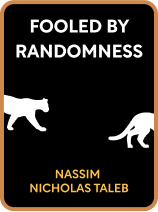

This article is an excerpt from the Shortform book guide to "Fooled By Randomness" by Nassim Nicholas Taleb. Shortform has the world's best summaries and analyses of books you should be reading.
Like this article? Sign up for a free trial here .
What is survivorship bias? How does this bias cause us to overestimate the likelihood of success?
Survivorship bias is the tendency to mistake the “surviving ” or successful sample as representative of the entire group. This bias causes people to see examples of enormous success as representative of the kind of success any person can expect in that venture or endeavor. For example, people see a fabulously wealthy stockbroker and think, “Trading is very profitable.” Or they see a bestselling author and think, “Writing is a great way to get rich.”
In this article, we’ll look at how survivorship bias prevents us from properly anticipating risk, and how not to fell prey to it.
How to Overcome Survivorship Bias
What is survivorship bias? We typically see only the people who have “survived,” or thrived in any given situation, and we extrapolate lessons from their survival: mainly, that wild success can be reasonably expected from this particular industry or venture. We fall prey to the survivorship bias partly because the wildly successful examples are simply more visible; the failures tend to slink away into obscurity and remain unnoticed. When we don’t see them, we forget they’re possible.
However, to accurately evaluate the potential for success in any venture, you must consider not only the observable results but also the invisible alternatives: the possible failures had the person’s luck been worse and success not been achieved.
For example, you can’t properly determine the likelihood of getting rich as a trader without accounting for the many people who have attempted it and failed. You can’t judge your chances of getting rich through writing without considering all those who couldn’t find a publisher or whose published book garnered few sales.
When you think about these invisible failures, you are thinking through “alternative histories” or “possible worlds”: other ways your path might have played out if your luck had been different. For instance, what might have happened if the market hadn’t jumped 500 points that morning? What if that large bet you made on that particular stock hadn’t worked out?
The History of Possible Worlds Thinking
The idea of possible worlds has been promoted in various branches of thought.
In philosophy, possible-world theories consider whether or not God produced an infinite number of possible worlds and then followed through on just one.
In physics, a many-world theory of quantum mechanics posits that the universe branches out, tree-like, at every change; we are living in just one of these many worlds.
In economics, the “state-space” method looks at economic uncertainty by examining the “what-ifs” that might happen under different markets or world conditions.
In mathematics, a field often applied to the study of investing, so-called Monte Carlo methods of thinking help produce a hypothetical set of alternative paths: successions of events that might have happened after an initial, defined event. Mathematicians even have a computer program called a Monte Carlo generator that produces enormous sets of these possible paths, allowing the user to examine thousands of possible outcomes given a certain set of conditions. These simulations have been used in everything from war preparations to financial markets to help policymakers and businesspeople calculate odds without the aid of complicated mathematical formulas.
Of course, you don’t need an actual Monte Carlo generator to think about possible worlds. When presented with a choice, imagine the possible outcomes and then go a few steps further to imagine the possibilities that might arise from each outcome. In this way, you can start to consciously see that the outcome you’re hoping for is only one of many possible outcomes.
It’s Hard to Spot Possible Worlds in Real Life
It’s easy to spot the random nature of the fortune produced by a hypothetical game of, say, Russian roulette, in which you are offered fifty million dollars to fire a gun loaded with one bullet and five empty chambers at your own head. These conditions are simple, limited, well-defined, and unarguably random.
It’s less easy to spot randomness in professions that hew closer to a mainstream expectation of income and that have fewer clearly defined parameters, like trading. But the random nature of these professions is equally as influential. This has been illustrated by studies that show stocks chosen by throwing darts at a list are as likely to succeed as those chosen by seasoned professionals.
The difficulty of recognizing random influences means it’s even more important to consciously try to. Because the fatal “bullet” is more infrequent in the real world, and because its risks are more vague and harder to spot, people end up playing Russian roulette without consciously realizing it—that is, they end up playing a game based on luck while thinking it’s based on skill. Then, when the beneficiaries of this random luck become role models, others are lured into the game thinking their odds of success are greater than they actually are.
Get into the habit of thinking about possible worlds and alternate paths and you will gain the ability to see possibilities every time you are presented with a choice. This will help you “learn from the future” so you can better assess risk, and more readily resist the pull of the roulette wheel.

———End of Preview———
Like what you just read? Read the rest of the world's best book summary and analysis of Nassim Nicholas Taleb's "Fooled By Randomness" at Shortform .
Here's what you'll find in our full Fooled By Randomness summary :
- The outsized role luck plays in success
- How we’re fooled by randomness in many aspects of our lives
- How we can accommodate randomness in our lives once we’re aware of it






